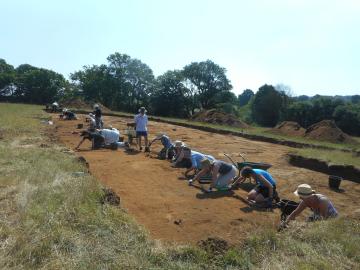Roman Studies Group
Recent fieldwork at Cocks Farm Abinger: Emma Corke
Site director, Emma Corke, will update us on recent fieldwork at Cocks Farm Abinger. Work in the field adjacent to the scheduled Roman villa, targeted using the results of magnetometry, has revealed a concentration of Iron Age grain storage pits, enclosure ditches and related activity, Romano-British field boundaries and agricultural ditches, and evidence for Bronze Age activity on the site (up to 2017 season).
Some Romano-British sites in East Hampshire: David Graham
David Graham, RSG vice-chairman, will be talking to us on archaeology in the East Hampshire border area, centred around the Romano-British small town of Neatham. He will draw together evidence for RB activity such as villas, a bath house, cemeteries and a pottery industry.
The garum and salt industries in Northern Gaul during the late Iron Age and Roman periods: James Bromwich
Garum was a favourite condimentof the Romans. It was made made from the fermented blood and innards of selected fish and was produced across the empire to meet the wide demand. Luckily, ancient sources describe the different types of garum and how it was made. The written sources are complemented by evidence from Pompeii, and it appears to have been a very lucrative trade. Salt was also a significant contributor to the Roman economy, and was vital to the preservation of foodstuffs including meat, dairy and fish.
Predicting Roman rural settlement in Surrey: Martyn Allen
Martyn Allen is well known to many in the Roman Studies Group, having talked to us previously, and as a freelance osteoarchaeologist he has provided expert bone reports for some of our excavations. He is currently a Post-Excavation Project Manager working for Oxford Archaeology Ltd. His research focuses on the settlement and agricultural economy of late Iron Age and Roman Britain, with an emphasis on the zooarchaeological evidence.
RSG AGM /The Bloomberg excavations, including post-excavation update: Sadie Watson
Sadie Watson is an experienced archaeologist who has extensive experience excavating and supervising complex urban sites. She was responsible for leading the excavations at Bloomberg London 2010-14, and has agreed to talk to us on this work, including the writing tablets found, and to give us an update on the post-excavation work.
Visit Lullingstone Roman Villa and Eynsford Castle
Saturday 19th May 2018 - Lullingstone Roman Villa and Eynsford Castle
Brian Philp, Kent Archaeological Rescue Unit, will lead us around both sites. Brian has spent 10 years digging on the Lullingstone Roman Villa and 40 years digging in the area.
Excavations at Cocks Farm Abinger 2017
The annual excavation took place at Cocks Farm Abinger in June-July 2017 under the direction of Emma Corke. Volunteers excavated two trenches in an area of high agricultural activity on the hill adjacent to the known Roman villa site. This area was identified during a magnetometry survey looking at the environs of the villa which uncovered a Roman field system, a Roman lime kiln and a concentration of pits.
Excavation at Cocks Farm, Abinger
Another season of excavation will take place in Summer 2018 at Cocks Farm, Abinger. Work will continue in the area of Iron Age and Romano-British agricultural activity, and the dig will run for a month.The dates are as follows:
Saturday 16th - Wed 20th June
Saturday 23rd - Wed 27th June
Monday 2nd - Wed 4th July
Saturday 7th July - Wed 11th July
Saturday 14th July - Tues 17th July

